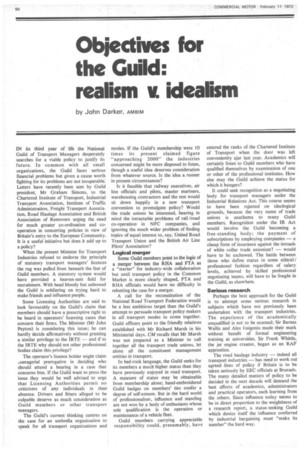Objectives for the Guild: realism vi idealism
Page 52

If you've noticed an error in this article please click here to report it so we can fix it.
IN its third year of life the National Guild of Transport Managers desperately searches for a viable policy to justify its future. In common with all small organizations, the Guild faces serious financial problems but given a cause worth fighting for its problems are not insuperable'. Letters have recently been sent by Guild president, Mr Graham Simons, to the Chartered Institute of Transport, Industrial Transport Association, Institute of Traffic Administration, Freight Transport Association, Road Haulage Association and British Association of Removers urging the need for much greater co-ordination and cooperation in concerting policies in view of Britain's entry to the European Community. It is a useful initiative but does it add up to a policy?
When the present Minister for Transport Industries refused to endorse the principle of statutory transport managers' licences the rug was pulled from beneath the feet of Guild members. A statutory system would have provided a heaven-sent field for recruitment. With head bloody but unbowed the Guild is soldiering on trying hard to make friends and influence people.
Some Licensing Authorities are said to look favourably on the Guild's claim that members should have a prescriptive right to be heard in operators' licensing cases that concern their firms. The Minister (Mr John Peyton) is considering this issue; he can hardly decide affirmatively without granting a similar privilege to the IRTE — and if to the IRTE why should not other professional bodies claim this privilege?
The operator's licence holder might claim .aanagerial prerogative in deciding who should attend a hearing in a case that concerns him. If the Guild want to press the issue they would be well advised to urge that Licensing Authorities permit no criticisms of any individuals in their absence. Drivers and fitters alleged to be culpable deserve as much consideration as Guild members or other transport managers.
The Guild's current thinking centres on the case for an umbrella organization to speak for all transport organizations and modes. If the Guild's membership were 10 times its present claimed figure "approaching 2000" the industries concerned might be more disposed to listen, though a useful idea deserves consideration from whatever source. Is the idea a runner in present circumstances?
Is it feasible that railway executives, air line officials and pilots, master mariners, warehousing contractors and the rest would sit down happily in a new transport convention to promulgate policy? Would the trade unions be interested, bearing in mind the intractable problems of rail /road co-operation. in NFC companies, and ignoring the much wider problem of finding topics of equal interest to, say, United Road Transport Union and the British Air Line Pilots' Association?
Logical merger Some Guild members point to the logic of a merger between the RHA and PTA as a "starter" for industry-wide collaboration but until transport policy in the Common Market is more clearly shaped, PTA and RHA officials would have no difficulty in rebutting the case for a merger.
A call for the reconstitution of the National Road Transport Federation would be a less ambitious target than the Guild's attempt to persuade transport policy makers in all transport modes to come together. Guild officers point to the friendly relations established with Mr Richard Marsh in his Ministerial days. CM recalls that Mr Marsh was not prepared as a Minister to call together all the transport trade unions, let alone all the constituent management entities in transport.
In bed-rock language, the Guild seeks for its members a much higher status than they have previously enjoyed in road transport. A measure of status may be obtainable from membership alone; hand-embroidered Guild badges on members' ties confer a degree of self-esteem. But in the hard world of professionalism, influence and standing are not won by a body of enthusiasts whose sole qualification is the operation or maintenance of a vehicle fleet.
Guild members carrying appreciable responsibility could, presumably, have
entered the ranks of the Chartered Institute of Transport when the door was left conveniently ajar last year. Academics will certainly listen to Guild members who have qualified themselves by examination of one or other of the professional institutes. How else may the Guild achieve the status for which it hungers?
It could seek recognition as a negotiating body for transport managers under the Industrial Relations Act. This course seems to have been rejected on ideological grounds, because the very name of trade unions is anathema to many Guild members. Recognition under the IR Act would involve the Guild becoming a free-standing body; the payment of subscriptions by employing companies — a cheap form of insurance against the inroads of white collar trade unionism? — would have to be eschewed. The battle between those who define status in some ethical/ professional fashion regardless of salary levels, achieved by skilled professional negotiating teams, will have to be fought in the Guild, as elsewhere.
Serious research Perhaps the best approach for the Guild is to attempt some serious research in subjects which have not previously been undertaken with the transport industries. The experience of the academically unqualified is not to be scorned; Sir Barnes Wallis and Alex Issigonis made their mark without benefit of formal engineering training at universities. Sir Frank Whittle, the jet engine creator, began as an RAF apprentice.
The road haulage industry — indeed all transport industries — has need to work out agreed lines of policy if Britain is to be taken seriously by EEC officials at Brussels. The many detailed matters of policy to be decided in the next decade will demand the best efforts of academics, administrators and practical operators, each learning from the others. Since influence today seems to be in direct proportion to the weightiness of a research report, a status-seeking Guild which denies itself the influence conferred by industrial bargaining must "make its number" the hard way.








































































































